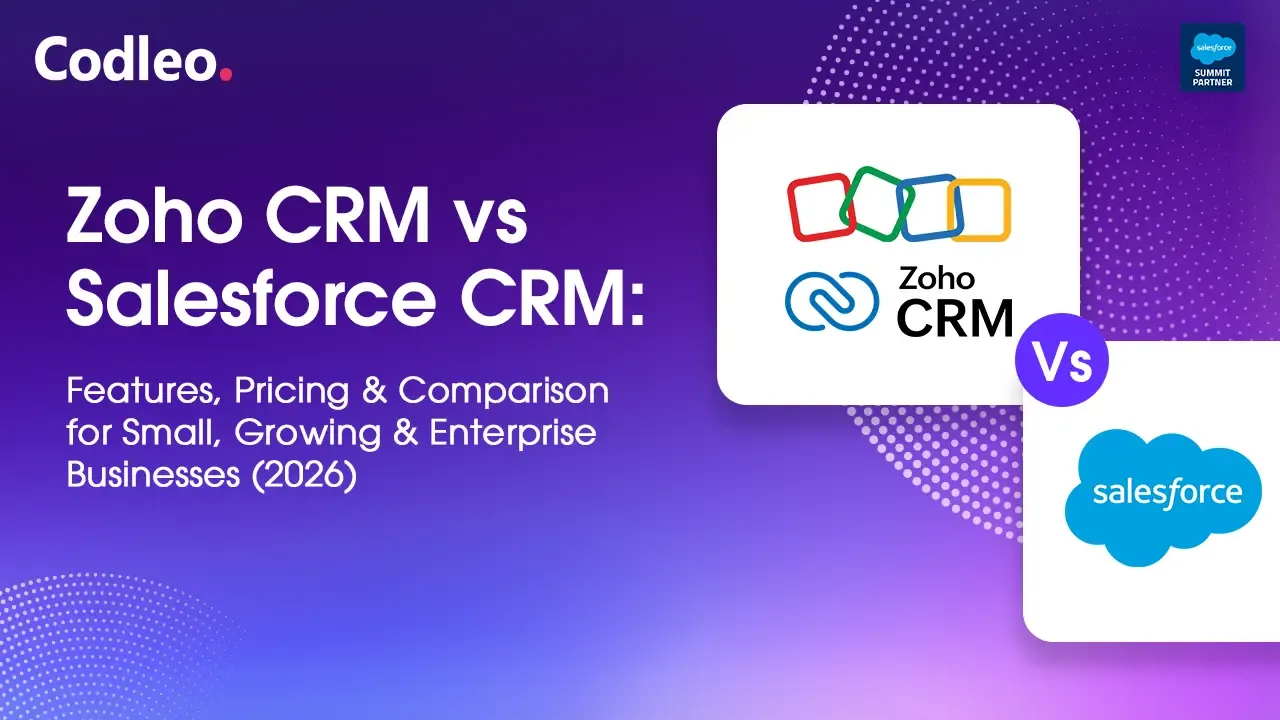
11 ESSENTIAL SERVICE CLOUD FEATURES YOU NEED TO UTILIZE

Customer satisfaction is crucial for businesses, and providing exceptional customer service is more important than ever. Customers are increasingly aware of their needs, and Service Cloud offers powerful tools to enhance support processes and drive loyalty.
In this article, we'll discuss the key Service Cloud features that organizations should leverage to deliver outstanding customer support.
1. Case Management
The Case object is central to Service Cloud, serving as the primary hub for all customer interactions. Service Cloud's case management system enables agents to efficiently track, prioritize, and resolve customer inquiries and issues. Utilizing features like case queues, assignment rules, and escalation processes, Service Cloud ensures that no customer request goes unattended.
Case Queues effectively organize and store customer inquiries based on specified criteria until an agent is available to handle them. This system integrates seamlessly with Case Assignment Rules, which classify new cases based on issue type or priority and then assign them to specific queues. When an agent or queue member is available, they can take ownership of the case, streamlining workflows and reducing response times.
Escalation processes automatically escalate unresolved or critical cases to higher-level support or management according to predefined criteria. For instance, an escalation rule can dictate that if a case remains unresolved 24 hours after creation, it will be reassigned to a senior agent or manager. This ensures that important issues are addressed promptly, SLAs are met, and delays are minimized.
2. Business Hours and Support Holidays
While not always in the spotlight, defining business hours and supporting holidays is a crucial aspect that is sometimes overlooked amid the setup of more specific rules and criteria. Establishing working hours for support teams ensures that cases are handled only during operational periods, helping to manage customer expectations, especially when resources are not available for 24/7 operations. Cases can be automatically assigned based on these defined business hours, ensuring they are addressed within the service team's working hours.
In addition to business hours, support holidays define non-working days, accounting for regional holidays or company-wide breaks/events. Properly setting up support holidays ensures that cases are not assigned or expected to be resolved during off periods, leading to more accurate calculation of response and resolution times.
Integrating support holidays into the case management system enables businesses to communicate clearly with customers about potential delays during these periods.
3. Omni-Channel
Customers today have high expectations when it comes to receiving support from businesses. They expect efficient communication across various channels, including email, phone, chat, and social media. While this multi-channel approach benefits customers, it can be challenging for agents to manage requests and cases effectively.
Service Cloud's omni-channel capabilities address this challenge by centralizing all customer interactions on one unified platform. This allows agents to have a complete view of each customer's history and preferences, regardless of the channel they use. Omni-Channel also includes features to monitor agent performance and maximize efficiency, such as the Omni-Channel Supervisor.
Consider a scenario where a customer needs support for a recently purchased product. They initially reach out via email, then later call the support hotline, and finally engage in a chat session for further assistance. With Omni-Channel, all interactions are linked to the customer's profile. This means that the agent who answers the phone can see the details of the customer's previous email, and the chat agent can access the customer's entire interaction history, including the email and phone call. This enables agents to provide more personalized and efficient support.
Throughout this multi-channel interaction, Service Cloud ensures that all communications are linked to the customer's profile, providing agents with a comprehensive view and maintaining continuity in the support experience. The Omni-Channel Supervisor feature tracks agent utilization in real time, ensuring that cases are routed to the most available and appropriate team members based on their expertise and skills.
4. Knowledge Base
Sometimes, customer inquiries are straightforward, and issues can be quickly resolved. Empowering customers to find answers to simple questions independently can greatly improve their experience. This is where a knowledge base proves invaluable.
A knowledge base serves as a centralized repository for articles and information related to a business's products and processes. It's akin to an encyclopedia that both customers and agents can refer to. The Knowledge Base can include articles, FAQs, and troubleshooting guides, effectively reducing support ticket volume by providing solutions and preventing dead ends in the support process.
For instance, imagine a customer facing a technical issue with a software application late at night. Rather than waiting for support during business hours, the customer can visit the company's support portal and search the knowledge base. If there's a detailed troubleshooting guide available, the customer can resolve the issue independently. This not only provides immediate assistance but also reduces the need for the customer to contact support, freeing up agent time for more complex inquiries.
5. Service Console
The Service Console offers agents a customizable workspace that enhances productivity and efficiency. With features like tabbed navigation, a utility bar, macros, and split views, agents can manage multiple cases simultaneously and resolve issues more effectively. It provides a comprehensive view of customer data and interactions, following Salesforce's 360-degree approach.
The split view displays a list view alongside the agent workspace, allowing for easy navigation between cases without needing to backtrack. The pre-configured three-column layout when viewing a Case record keeps all essential information within a single view. This layout minimizes the need for scrolling, as agents can already see the case feed, contact details, and related lists.
Additionally, the Service Console includes a utility bar for quick access to Notes, History, Macros, and the softphone. This feature further streamlines the agent's workflow, enhancing their ability to provide timely and efficient support.
6. Swarming
During my tenure at Salesforce Support, one of the newer features we implemented was Swarming, which significantly improved our support process. Swarming encourages collaboration among team members to solve cases more effectively. Instead of transferring cases between agents, Swarming brings together experts in real time to address complex issues swiftly. Collaborators can communicate via Chatter or Slack, enhancing the problem-solving process.
Here's how Swarming works: when a customer submits a case regarding a highly technical issue with their enterprise software, the first-level support agent recognizes the complexity and initiates a Swarm. This Swarm includes a product specialist, a technical support engineer, and a customer success manager. By pooling their expertise and resources, they can diagnose and resolve the customer's issue more efficiently than if the first-level agent handled the case alone or escalated it immediately.
Throughout the process, the original agent remains the primary point of contact for the customer, ensuring a seamless and coordinated support experience.
7. Service Cloud Voice
If your support center primarily handles cases through customer phone calls, or if your business operates a call center, you likely already have a telephony system in place. Service Cloud Voice supports integration with multiple telephony systems, allowing agents to make and receive calls directly from the Service Console. This integration is advantageous as it enables agents to access caller information, create cases, and log interactions directly within the Salesforce platform, all while on the call.
Click-to-dial functionality is a convenient addition to an agent's workflow, ensuring a seamless experience. Service Cloud Voice also offers benefits from a management perspective with its Omni Supervisor integration, real-time transcription, and integrated call recording. These features make it easier for supervisors to monitor and conduct quality checks on customer conversations, improving overall customer support quality.
8. Web-to-Case and Email-to-Case
Cases can be initiated through various channels, and some customers, especially those with non-urgent issues, prefer communicating with support via email rather than phone calls. If your business has a public-facing website, setting up Web-to-Case can be beneficial. This feature allows customers to submit cases to your support team through a form on your website. Similarly, Email-to-Case enables customers to create a case record by simply sending an email to your support email address.
These features offer great convenience to customers, allowing them to seek support through their preferred channel and at their convenience, even outside of regular business hours. Additionally, these tools automate case creation, reducing manual entry, and ensuring that all customer inquiries are captured and tracked within Salesforce.
9. Messaging
Service Cloud’s messaging feature broadens the communication options available to support agents. Besides the traditional call, email, and chat methods, customers and agents can now engage via WhatsApp and Facebook Messenger. Key benefits of messaging include:
-
Sending voice messages for a more dynamic communication experience.
-
Adding drop-down fields to pre-chat forms for better data collection.
-
Integrating messaging capabilities directly into your customer-facing website.
-
Managing and controlling sessions for streamlined interactions.
10. Field Service
Field Service is an extension of Service Cloud that caters to businesses involving mobile employees, like technicians or engineers, who work in the field or on-site. It offers a comprehensive solution for managing tasks such as service appointments, work orders, and asset management, making it an ideal tool for businesses with field operations.
One of the key benefits of Field Service is its smart scheduling feature, which optimizes dispatching to ensure the right technician is assigned to the right job. This reduces travel time and increases overall efficiency. Additionally, Field Service includes a mobile app that provides technicians with real-time access to work orders, customer information, and knowledge articles, even when offline. The app also allows technicians to capture signatures and log parts used on-site, further streamlining the field service process.
11. Visual Remote Assistant
As a customer seeking technical support, have you ever thought that your issue could be resolved faster if the agent could see the situation firsthand? Imagine the enhanced efficiency and speed of problem-solving if customers and agents could engage in video streaming and desktop sharing during troubleshooting sessions.
The Visual Remote Assistant offers real-time visual support to customers and field technicians, allowing experts to provide remote guidance via video. This tool elevates interactive guidance with Augmented Reality (AR) annotations, enabling experts to draw on the live video feed to highlight specific areas or actions. This approach offers a much clearer and more effective means of communication, making it easier to resolve issues quickly.
Summary
Implementing Service Cloud can turn support teams into strategic assets, provided businesses know how to leverage its features effectively. Understanding its capabilities helps determine which features best fit daily support operations and are worth adopting. From basic case management and omni-channel support to advanced field service and visual remote assistance, Service Cloud offers a robust array of tools designed to streamline customer service operations.
These features boost agent productivity and ensure efficient customer interactions. Adopting these capabilities enhances the customer experience and helps businesses maintain a competitive edge in the market.
Don’t let your customer service fall behind. Contact Codleo Consulting to integrate the Service Cloud and enhance your support team’s efficiency.
Latest Blog
Say "hello" to us and lets gets talking
Partner with the best team in the world for your CRM or other digital needs.
Contact Us




